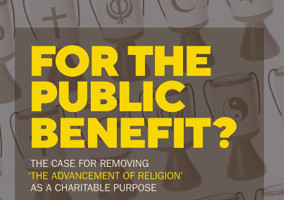Charities that offer “gay conversion therapy” should be investigated and stripped of their charity status if they do not cease the practice, campaigners and politicians have said.
Civil Society News has identified a number of registered charities that say they will “support” LGBT people who want to “transform”, or offer services to people “who voluntarily seek change in sexual preference and expression”.
Two years ago the government said it would look to introduce a ban on such activity, and Liz Truss said today that plans would be published soon.
She told Parliament: “We have commissioned research to look at the scope of these practices in the UK, and when we receive that research back we will publish our plans shortly.”
Politicians and LGBT rights campaigners have told Civil Society News that there urgently needs to be a ban on conversion therapy, and that charities should not be exempt on religious grounds.
Conversion therapy is the umbrella term for a type of activity which attempts to change sexual orientation or reduce attraction to others of the same sex, according to the UK Council for Psychotherapy (UKCP).
Registered charity ‘supporting men and women with homosexual issues who voluntarily seek change’
Core Issues Trust, registered with the Charity Commission for Northern Ireland, is one charity that has received a lot of attention.
It states that it is “challenging gender confusion” and “upholding science and conscience”.
The charity says it is a “non-profit Christian ministry supporting men and women with homosexual issues who voluntarily seek change in sexual preference and expression”.
Its listing on the regulator’s website says that it exists “to promote lifestyle-choices consistent with Christian living”, and adds that “the charity encourages the interrogation of ideology, both religious and secular, through analysis and critique of diverse perspectives and readings of the literature relating to human sexuality and Christian living”.
There are several petitions asking the regulator investigate the Core Issues Trust. One petition which asks the regulator to reconsider Core Issues Trust’s charitable status has more than 10,000 signatures.
The Charity Commission for Northern Ireland said it was considering these calls, but “the purpose of charity law is not to say if a certain belief is right or wrong”.
A spokesperson added: “The definition of a charity in law says that you must be established for exclusively charitable purposes, that is, each purpose falls under one or more of the list of 12 descriptions of purposes set out in section 2(2) of the Charities Act (Northern Ireland) 2008 (as amended) and is for the public benefit.
“There are other considerations, of course. For example, a purpose must be beneficial, not harmful. For example if any organisation, including a religious one, requires improper pressure to be placed on people to remain within that organisation against their will, or completely withdraw from society, then there is likely to be more harm than benefit. A purpose must also not promote hatred towards others who do not share the same religion.
“The Commission is aware of, and is considering in detail, the issues highlighted relating to the Core Issues Trust.”
In a statement the Core Issues Trust criticised the UK government's announcement as an example of “increasing state control of every aspect of our lives”. Full statement here.
Support people with same-sex attraction who want to 'transform'
Meanwhile, the Evangelical Alliance, a multi-million-pound charity made up of hundreds of organisations and thousands of churches, asks its congregation to support people with same-sex attraction who want to “transform”.
"We encourage evangelical congregations to welcome and accept sexually active lesbians and gay men. However, they should do so in the expectation that they, like all of us who are living outside God’s purposes, will come in due course to see the need to be transformed and live in accordance with biblical revelation and orthodox church teaching.
“We urge gentleness, patience and ongoing pastoral care during this process and after a person renounces same-sex sexual relations,” its website states.
The charity operates in Scotland and other parts of the UK. A spokesperson for the OSCR, the Scottish regulator, said it does not currently have an open inquiry into the Evangelical Alliance.
The Evangelical Alliance did not respond to requests for comment.
Another charity, Affinity Church Centred Partnership For Bible Centred Christianity, has published an article calling for churches to resist attempts to ban pastoral care for those “who want help to overcome same-sex attraction”.
It states that “the right to provide pastoral care for people of both sexes who experience unwanted same-sex attraction is under threat”. It adds that the “normalisation” of homosexuality “has been a concerted attack on all kinds of help offered to people with unwanted same-sex attraction, be it from counsellors, psychotherapists, psychiatrists, Christian pastors, pastoral counsellors, healing ministries or self-help groups.”
Twenty-one church groups belong to Affinity together with other independent congregations from all parts of the UK and Ireland. In all there are more than 1,200 churches in fellowship with Affinity and it claims to be one of the largest groups of evangelical churches in the UK.
Graham Nicholls, director of Affinity (Gospel Churches in Partnership), said: “Affinity is a network of evangelical churches, which seeks to support denominations and para-church organisations. As a network we represent about 100,000 Christians and seek to speak on their behalf on a whole range of issues.
“Unlike some of our members, Affinity is not predominantly a campaigning organisation. Through our work with churches, we believe it is important to teach the faith as we understand it, but realise we do not speak for everyone.
“Whilst Affinity publishes articles which subscribe to the traditional teaching of the church from a conservative, biblical viewpoint, sexuality and matters of sexual ethics are not at the forefront of our work. We believe it is important for there to be a sympathetic, faithful and nuanced biblical view on these matters being taught in churches and communicated in the wider media.
“Language is important in how, as conservative evangelical Christians, we communicate in public discourse. However, we maintain that transformation is a biblical imperative for every person through accepting Jesus Christ as their Lord and Saviour and is a challenge for all of us; it is not just related to sexuality. No-one should ever be coerced.”
De-register charities that practice or advocate ‘conversion therapy’
Jayne Ozanne, chief executive of the Ozanne Foundation, a charity which works with religious organisations to eliminate discrimination based on sexuality or gender, believes charities which practise or advocate gay conversion therapy should be de-registered.
She said: “Given the harm that we know conversion therapy causes, I believe that it is imperative that those organisations that practise or advocate it are fully investigated by the regulators and if necessary, stripped of their charitable status. They are not providing a service for the public benefit, indeed quite the opposite.”
Megan Manson, head of policy and research at the National Secular Society, agrees that charities promoting the practise should be stripped of their charitable status. She said: “Charities are meant to benefit people, not harm them. But all reputable health and psychological organisations consider so-called 'gay conversion therapy' to be ineffective, unethical and harmful. It's therefore clear that any organisation promoting 'conversion therapy' shouldn't be a registered charity.
“The Charity Commission can help to tackle this by opening investigations into, and taking strong action against, charities which promote 'conversion therapy'. But the reform of charity law, to remove 'the advancement of religion' as a charitable purpose, would make it far harder for organisations that promote such bogus therapies to register as charities in the first place.”
'Purposefully use opaque language in this area'
Ozanne added that there needs to be clarity on what is meant by conversion therapy, in order to ban it.
She said: “I also believe that it is important that the charity regulators consider whether those organisations that teach young and vulnerable LGBT people that they have to be celibate for life are themselves providing a public benefit, or are – as many of us believe – inflicting significant harm at a key stage of a young person's development.
“Critically, there are various religious organisations that purposefully use opaque language in this area, such as the term 'transform' or 'transformation', which I would urge the Charity Commission to investigate and seek clarification as to what is precisely meant. This is a term that for many is code for having to deny, suppress and/or change their sexuality and/or gender identity.”
A ban on conversion therapy is supported by some faith leaders.
Bishop of Liverpool, Rt Revd Paul Bayes, said: “Given how deeply damaging we know conversion therapy to be, it is critically important that all faith leaders understand the impact that their words can have on people in their care.
“We need to ensure that we are clear and unequivocal that LGBTI+ people are made and loved by God and are acceptable – just as they are. It’s vital to avoid using any words or phrases that can be misconstrued to mean otherwise.
“In particular, to demand that people should "change" or “transform” themselves because of their sexual orientation or gender identity is dangerous and wrong.”
Charities cannot be exempt from ban
Baroness Barker, the Liberal Democrat spokesperson on LGBT issues and the voluntary sector in the Lords, said: “What we need to do is to make sure that conversion therapy is illegal, and that any organisation or individual practitioner who provides that is breaking the law.”
Barker added that no charities should be exempt. She said: “I do not think it should be a defence for a charity so say that conversion therapy is part of its belief system, and therefore they can be exempt. Therefore, there has to be a ban. There is plenty of evidence that it is deeply harmful, it is vicious - it's torture.”
She added: “I am sure that there are organisations which have not waited for a change in the law but have already announced that they will not be part of such damaging behaviour.
“I think there is a legitimate question to ask, which is if a charity is willing to torture LGBT individuals in this way, does that not beg the question what else they might do to other people? And does it not fundamentally call into question the basic premise of them being a charity?”
According to the UKCP, “it is exploitative for a psychotherapist to offer treatment that might ‘cure’ or ‘reduce’ same sex attraction as to do so would be offering a treatment for which there is no illness”.
Ben Bradshaw, Labour MP for Exeter, said that the government urgently needs to pass legislation banning the practice.
He said: “It is nearly two years since we learnt of the government's plans to end conversion therapy, during which time untold numbers of people, young and old, have continued to be traumatised by this horrific practice.
“We urgently need to pass legislation that will provide a clear deterrent to protect those whose lives are sadly put at risk, and to signal to those organisations that are determined to continue that we will no longer countenance their behaviour.”
Charity Commission to assess information
Civil Society Media brought information to the Charity Commission for England and Wales about charities seeming to support conversion therapy. The regulator has said that it will look into the charities and see if they need to be investigated.
A spokesperson said: “Charities exist to improve lives and strengthen society and they should always be places where people can feel safe and are free from harm. Information shared with us has been assessed and will be examined by our regulatory compliance team. We cannot comment further at this time.”
Following the publication of the article the Core Issues Trust issued this statement:
“At a time when church buildings are in lockdown and churches unable to meet, we are concerned that the UK government in seeking to ban therapeutic choice is now extending lockdown to the very personal area of sexual identity and practice. We encourage Christians everywhere to be alert to the increasing state control of every aspect of our lives and the corresponding decline in the role the church plays in public life.
“In the light of the need to ensure that practitioners who support a Judeo-Christian understanding of the human body, sexual ethics and marriage and who offer counselling support for those who have unwanted homosexual feelings or gender confusions, our organisation has worked with other players from Europe, Asia and North America to establish the International Federation for Counselling and Therapeutic Choice (IFTCC.org). Established in 2015 and registered in the UK in 2018, this multi-disciplinary organisation has actively engaged with the issue of banning therapeutic choice and the unsupported notion of 'born gay'. Please see our 2019 declaration on the matter of therapeutic choice here.
“Most recently we have made contributions to the United Nation and before then (2019) the OSCE in Warsaw. We have examined the UK government’s proposed plan to ban therapeutic practise and written a detailed response to this. We have, with reference to the known scientific evidence, explained the danger of banning choice to our society and what the harmful consequences of doing so to our countries would be. Beyond that, Core Issues Trust has articulated our care for the individuals who seek our help in our 2020 CIT Safeguarding Document.
“Core Issues Trust has since 2012 consistently asked the UKCP and Royal College of Psychiatrists to provide the peer-reviewed scientific research that shows, categorically and on average, that counselling and therapeutic interventions for those with unwanted feelings are harmful. To date, no such evidence has been provided to us. On the contrary, the largest psychological association in the world, The American Psychological Association (APA) as far back as 2009 argued there was insufficient evidence one way or the other to resolve this issue.
“At a time when the government has claimed the basis of its lockdown initiatives to be scientific evidence, we wonder why its lockdown in banning therapeutic choice, forbidding individuals to change sexual identity or to find alternative practices and to transform experience to align with their primary values is based solely on ideology and not science?
“What we are experiencing in the United Kingdom today is viewpoint discrimination and the fact is that one opinion serves as judge, jury and executioner. If scientific method really is important why is ideological diversity, debate and dissent disallowed? There can be only one answer: we are seeing the fruit of cultural marxism and the church has lost its sense of discernment and independence.”
Related articles












